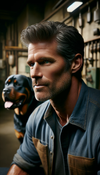Training Your Rottweiler Puppy at 9-12 Months: Effective Techniques and Strategies
Understanding Your Rottweiler's Developmental Stage
At 9-12 months of age, your Rottweiler puppy is navigating the transition from puppyhood to adolescence. This period is critical for reinforcing obedience and establishing authority as your dog's pack leader. During this phase, your Rottweiler will have most of their adult strength and energy but might still have a puppy-like mindset. It's important to continue training with a positive approach, rewarding good behavior, and setting consistent boundaries.
Consolidating Basic Commands
By now, your Rottweiler should understand basic commands such as "sit," "stay," "come," "down," and "heel." This is the time to solidify these commands, ensuring they are followed every time. Practice in various environments with different levels of distraction to reinforce their obedience. Utilize positive reinforcement techniques such as treats, praise, or play to reward compliance. Consistency is key; make sure everyone in the household uses the same commands to avoid confusing your puppy.
Addressing Adolescent Behaviors
This stage in your Rottweiler's development can be marked by testing boundaries. It's crucial to address any undesirable behaviors promptly. If your puppy is displaying signs of dominance or stubbornness, it's essential to reinforce your position as the alpha. Employ firm, clear commands and maintain a calm demeanor. Obedience classes or a professional dog trainer can be beneficial at this stage, especially if you're encountering significant behavioral challenges. Remember to always use humane, positive training techniques; physical punishment can lead to fear and aggression in powerful breeds like Rottweilers.
Leash Training and Socialization
Leash training remains an important part of your Rottweiler's development at this age. Ensure your puppy is comfortable with a collar and leash and continue to practice walking without pulling. Being a large and powerful breed, Rottweiler must learn to walk politely on a leash to prevent them from becoming unmanageable as adults.
Socialization should also continue: exposing your Rottweiler to different people, dogs, and situations will help them develop into well-adjusted adults. Dog parks, hikes, and neighborhood walks are great opportunities for socialization, but monitor interactions and intervene if your puppy becomes too boisterous or aggressive.
Advanced Training and Mental Stimulation
Rottweilers are intelligent dogs who crave mental stimulation. Once you've mastered basic commands, introduce more complex tasks such as agility training, advanced obedience, or nose work. These activities provide both physical exercise and mental challenges, keeping your puppy engaged and content. Puzzle toys and interactive play can also help in honing their problem-solving skills.
Preparing for Adulthood
As your Rottweiler nears one year old, it's an ideal time to start emphasizing behaviors that will be important in their adult life. This includes calmly greeting strangers, behaving well around other animals, and being manageable in different settings, from vet offices to outdoor cafes. These training elements will help ensure your Rottweiler grows into a well-mannered adult dog.
Maintaining Health Through Training
Keep an eye on your Rottweiler's physical health as they grow. Ensure they're getting enough exercise to prevent obesity, a common issue in the breed. Tailor exercise to their age and physical condition; for instance, lengthy runs are not advisable for developing joints. Finally, continue to follow guidance on proper nutrition specific to Rottweilers to support their growth and training regimen.

